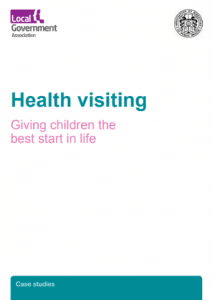21st March 2019
The Institute of Health Visiting very much welcomes the LGA (Local Government Association) call for fresh investment into health visiting after the number of health visitors has declined very significantly over the past three years following reductions in public health budgets.
The health visiting service model needs to be based on proportionate universalism and ensure that support is available for all children and their families at all levels of need. Families lives change over time, hence so do their needs. The service must be sufficiently flexible to be available to families as and when it is needed.
The best way of achieving this is by families having continuity of care from one health visitor, having time to build a relationship with them and, as a result, being trusted by the family as a source of support. In this way, families feel confident in seeking help from the service should they need it, with health visitors also having ‘touch points’ with them for their child’s developmental assessments. It is also linked to increased identification of children in need and at risk of poor outcomes. It must be recognised that it takes time to build effective trusting relationships with families who often have multiple competing needs.
The health visiting service specification also needs to be sufficiently resourced to ensure the quality and quantity of provision needed to deliver effective prevention and early intervention. We strongly urge the government to put in place a more robust system for the future which removes the risk of future year-on-year cuts of the type happening now which have put a generation of children at risk and are likely to prove much more costly in terms of unrecognised health needs and late intervention in the longer term. As the LGA document Health visiting: giving children the best start in life demonstrates, some areas in England such as Blackpool have made it a priority to invest into their health visiting service despite their reduced budget, recognising the longer term benefits this will bring their citizens. Other UK countries, such as Scotland, have made investment into health visiting a policy priority to improve the status of child health and wellbeing across all of Scotland.
The evidence is clear – the most effective health visiting services use an asset-based, personalised whole family approach taking into account the context in which families live. On the contrary, the evidence is also clear that fragmenting people’s lives into individual problems, using a tick box, one-size fits all approach that diminishes the professional autonomy of the health visitor, is ineffective. We hope that any new investment will be used in a way to ensure that these essential components of the health visiting service are in place so that the service is once again able to deliver the outcomes for children and families which it can and should be.







